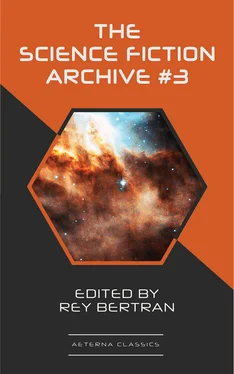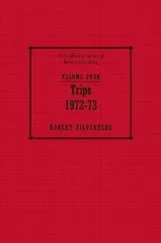It was two months before he touched a transformer or a capacitor and during that period he did nothing but try to answer the question, What is time? How could he overcome it or change its flow or whatever had to be done?
He read everything he could find on the subject from Dr. Cagliostro to Dr. Einstein without gaining much insight. Many a midnight, when his neck muscles ached from trying to hold up his throbbing head, he caught himself dreaming of grandmother's wonderful stories. And every time he forced himself furiously back to the books, but he couldn't stop the nostalgia entirely. It was in him.
Eventually, Edgar came to think of time as an infinite series through which the Universe was constantly expanding. Something like a set of stop-motion photos taken microseconds apart, each complete, the changes becoming apparent only when they are viewed in sequence. He was wrong, of course, but that was unimportant.
Time must therefore be a function of human motion and consciousness, Edgar reasoned, and that was important.
"That's it!" he exclaimed, and then apologized gracefully to the elderly gentleman glaring across the library table.
Now that he knew what his time machine must do, he could begin building, adapting circuits, experimenting. Obviously, consciousness could move forward through the series only; hence, consciousness must be completely suspended, as in death, to move back in time.
It required some heartbreaking months for Edgar to learn that brain waves couldn't be stopped, but that the simple trick of introducing random electrical noise suspended all the brain functions.
"Fudge!" cursed Edgar, thinking of the wasted time.
Only a man filled with the longing which obsessed Edgar could have found the aching perseverance and brain-wrenching ingenuity the job needed. Only a man driven by a terrible master that rode in his glands.
But four months later, he stood with his hand on a switch, sweating with nervous excitement as he eyed the spot from which a live rabbit had just disappeared. The rabbit was on the table, but he was there an hour ago and Edgar was here now, so the table appeared empty.
He pressed another switch and there was the bunny, wriggling its soft nose in perplexity, but perfectly healthy. Edgar's own trip, of course, would be strictly one way since the machine stayed in the present. He could be brought back only if he stepped into its field on a date for which the machine was set and he had absolutely no intention of venturing near this vicinity again, once his aim was accomplished.
He thought about arranging a small explosive charge to blow the equipment to what he thought of as The Hot Place. It seemed to him, however, that there was some kind of law against that sort of thing. Besides, even if the machine should come to the attention of the authorities, who would know what it was? He could devise a mechanical scrambler to change all the control settings once he was gone, and it was unlikely that anyone could operate it again.
Most likely the landlady would simply sell it for junk, especially if he left owing her a week's rent. The idea hurt his conscience.
"I know!" he exclaimed to himself. "I'll buy a bank check and arrange to have the bank mail it to her a month after I've left!"
He felt much better about that.
Three weeks later, Edgar Evans was the newest boarder at Mrs. Peterson's, on Elm Avenue in Greencastle, Indiana. He had arrived on April 3, 1893, the day after Easter, and already he was being referred to as "that nice young man staying at Emma's."
Edgar snuggled into the life of the '90s like a showgirl into mink. He went to work as a clerk in Cloud's Emporium and was soon regarded as logical choice for the next manager. Anxious mamas filled his evenings with dinner invitations and "at homes" and he had a dazzling choice of partners for the numerous socials.
Edgar waltzed his partners with zest and propriety, contributed a determined tenor at parlor sings, and sampled dozens of cakes and pies baked by maidens bent on winning his heart via the traditional route. And always he had a gracious compliment, an appropriate phrase for every situation.
Within a month, the entire feminine population of Greencastle was his for the asking, though he'd never have recognized nor admitted the fact. The men sought his company, too, and even asked his advice on how to win their girls back from him. Edgar, almost sick with happiness, told them, of course.
On the eleventh of November, he was sick with something else. He went to bed with a fever right after getting home from the Emporium, Mrs. Peterson hovering helplessly with offers of hot broth or tea. But Edgar felt hot and dry and his side hurt when he breathed.
"I don't want anything … thank you," he gasped politely.
By the next noon, when the alarmed Emma Peterson had Dr. Ward in, Edgar was barely conscious. Dr. Ward frowned, ordered hot water bottles and gave Edgar a huge dose of hot whiskey with lemon.
"Penicillin, please," whispered Edgar painfully. "Or sulfa. It's pneumonia, isn't it?"
"Poor fellow's delirious," said the doctor to Mrs. Peterson.
Edgar realized dimly that he had made a blunder, but that no one would know. Then the fever took over and he blanked out.
Dr. Ward claimed ever afterward that clean living was what pulled Edgar through—the fact that he wasn't conditioned to liquor gave the medicinal whiskey virgin ground to work in.
All Edgar knew was that he came to and found himself so weak that he could scarcely speak. Mrs. Peterson and her daughter, Marta, bustled in and out to care for him. He hadn't paid particular attention to Marta before, but in the days of lying helpless and being literally spoon-fed, he began to know her very well.
Marta was a plain girl, he had thought, but he had never seen her private smile before. Marta was rather dumpy, he had thought, but he had never watched her bend to pick something up or twist to reach for a medicine bottle. Her dresses, he discovered, were deliberately all wrong for her—Mrs. Peterson had no intention of disturbing her boarders unnecessarily.
In the shocking intimacy of his bedroom, Edgar was increasingly disturbed. Marta was unfailingly cheerful, eager to wait on him. Every half-hour, he heard her step in the hall.
"Hello!" Marta would say, sweeping lightly to his bedside. "How's our patient now? Feeling better? Oh, dear, do let me just straighten that sheet. It's all wrinkled. Would you like some milk or some fruit?"
"Not right now, thank you—perhaps a little later," Edgar would reply, fixing his gaze determinedly on the window or the ceiling while she bent over his bed, disturbingly rounded and disastrously close.
And as Edgar's recovery progressed, Mrs. Peterson dropped more and more into the background. On the day Dr. Ward said he might try sitting up for a while, it was Marta who stood by for the experiment.
Edgar started nobly, made about a foot of arc by himself and faltered. Instantly, it seemed, Marta's arm was around his shoulders and a firm, warm projection cushioned his cheek.
He very nearly collapsed, but she sat him up.
Three days later, he held her hand for a moment and, though she blushed, she didn't draw it away in a hurry.
After a proper interval, their engagement was announced. Half the maidens in Greencastle wept in the privacy of their pillows that night.
Edgar had had a serious problem and solved it. He had found the right girl and married her. This should be the end of his story and it would be, except for two things—Edgar's gene and the date of his birth.
Edgar's gene came from his grandmother via his father. The stories that gentle old lady told her orphaned grandson were the only outlet she had for her own powerful urge to turn back the times. And there had always been someone in the family who bemoaned the passing of the good old days, so strongly and constantly as to bore others to the verge of violence.
Читать дальше












